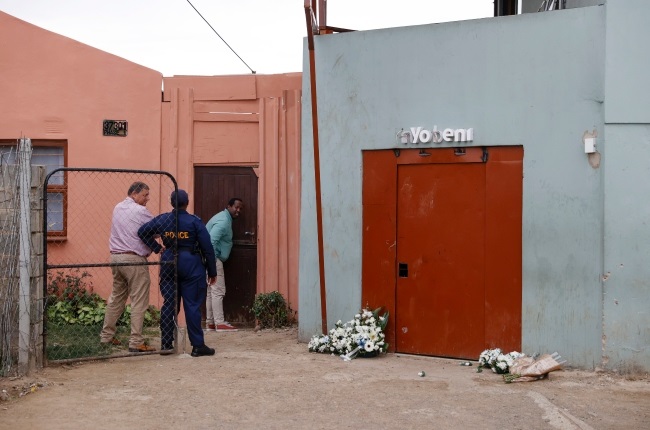
Everybody has failed.
These are the findings of the South African Human Rights Commission following their investigation into the deaths of 21 Eastern Cape teenagers at a tavern.
On 26 June 2022, South Africans woke up to the tragic news that 21 teenagers had died at Enyobeni Tavern in Scenery Park, East London.
At the time, the cause of death was unknown. Several reports came that there was a stamped, then it was said that the teens ingested some kind of toxic gas.
Now almost two years later, the parents still do not know what killed their children. What is not in dispute is that there was only one exit and there were no windows. The children collapsed, one after the other.
SAPS officials from the Scenery Park police station confirmed their awareness of complaints against the Enyobeni Tavern dating as far back as December 2021.
Now the South African Human Rights Commission (SAHRC) says after extensive involvement in all dialogues trying to get to the bottom of the tragedy, and their own investigation, they have found that the stakeholders have either failed in their responsibilities towards the teens, their families and the community or they have violated their human rights.
The commission says to move forward, the State must demonstrate a renewed commitment to tackling the scourge of alcohol abuse by expediting the legislative process and implementing robust enforcement mechanisms.
They have highlighted each of the stakeholders and how they failed in their respective roles. The findings are as follows:
The Eastern Cape Liquor Board (ECLB)
- The Commission finds that the ECLB’s conduct and/or omissions have contributed to violations of fundamental human rights in the unfolding of the Enyobeni Tavern tragedy.
- Despite acknowledging severe human capital challenges, the ECLB persisted in issuing liquor licenses without the requisite capacity to adequately monitor and enforce compliance.
- By continuously issuing liquor licenses knowing it would not have the capacity to oversee and inspect the operations of license holders such as taverns, the ELCB deliberately neglected to protect vulnerable members of society against the illicit trade of alcohol and its associated alcohol harms.
- The Commission also finds that the weak legislative framework and nominal fines imposed on liquor outlet owners for violations fail to serve as an effective deterrent, further exacerbating the risk of harm and contributing to the violation of human rights.
Read more | Enyobeni owners’ R5 000 sentence a slap in the face – Victims’ parents
Buffalo City Metropolitan Municipality
- The Commission finds that the BCMM failed to fulfil its obligations in ensuring the protection of fundamental human rights, particularly in relation to zoning regulations, monitoring of liquor license applications, and the establishment of a Local Drug Action Committee (LDAC).
- The revelation that the Enyobeni Tavern operated without proper zoning as a business establishment underscores BCMM's failure to enforce zoning laws and building regulations, directly infringing upon the right to a safe and healthy environment as safeguarded by international human rights instruments.
- The Commission concludes that BCMM's conduct regarding the Enyobeni Tavern tragedy reveals significant shortcomings in its regulatory oversight and responsiveness to community concerns.
South African Police Service
- The Commission finds that the SAPS failed to fulfil its duty to protect public safety and uphold relevant regulations, thereby contributing to a range of human rights violations in relation to the Enyobeni Tavern tragedy.
- SAPS's inadequate response to reports of underage drinking and other violations at the tavern raises concerns about the thoroughness and effectiveness of its investigations, directly impacting the right to a safe and healthy environment, particularly for vulnerable individuals such as children.
- Despite receiving complaints regarding noise and public drinking near the tavern, SAPS's reactive approach focused on dialogue rather than strict enforcement of relevant laws and regulations.
Read more | 'This is a wound that will never heal' - parent of one of the 21 teens that died at Enyobeni Tavern
Eastern Cape department of health
- The Commission finds that the Department of Health's handling of the Enyobeni Tavern tragedy has resulted in violations of the right to dignity of the victims' families.
- The initial reports suggesting methanol poisoning as the cause of death, later refuted, followed by the emergence of suffocation due to overcrowding as the purported cause, created confusion and distress among the affected families.
- The lack of clarity and consistency in the information provided exacerbated their trauma and denied them the dignity of knowing the truth about the circumstances of their loved ones' deaths.
- The obstacles faced by family members in accessing relevant information, and the department's explanation citing confidentiality and legal constraints, raise questions about transparency and accountability in the investigation process, further eroding the families' sense of dignity and respect.
- In failing to provide timely and transparent resolution of the matter, the Department of Health has failed to uphold the dignity of the victims and their families, thereby violating their fundamental human rights.
National Department of Social Development (NDSD) and the National Department of Trade and Industry (NDTI)
- The Commission finds that the National Department of Trade and Industry and the Department of Social Development have failed to fulfil their obligations under Section 7(2) of the Constitution, as well as their obligations under international treaties such as the Convention on the Rights of the Child (CRC) and the African Charter on the Rights and Welfare of the Child (ACRWC).
- The NDTI and the NDSD have failed to prioritize improving legislation that could have protected the lives of the victims of the Enyobeni Tavern tragedy and others affected by alcohol related harm.
- The failure of the NDTI and NDSD to prioritize and further these measures demonstrates a clear disregard for their obligations to protect children's rights and promote public health and safety.
In addition to the findings, the Commission has also released their recommendations as part of the 86-page document.
One of the considerations is for the Liquor Board to consider an immediate halt in the issuing of any new on-site liquor licences.
“This pause will allow the ECLB to address the current deficiencies in enforcement and ensure that future licences are granted responsibly,” the report reads in part.
- The ECLB must prioritize meaningful engagement with affected communities during the liquor licensing process and renewal by way of its physical presence and participation.
- BCMM must immediately establish the required Local Drug Action Committee (LDAC) to fulfil its obligations under relevant legislation and promote substance abuse prevention and intervention efforts.
- BCMM must identify suitable communities for planning, developing and installing recreational facilities to promote community development and youth empowerment.
- BCMM (must) further ensure that they are fully resourced and accompanied by a diverse range of activities.
- Development of a year-round activity schedule where BCMM should work with community leaders, youth organisations and educators to create a comprehensive calendar of events that cater to different age groups, interests as well as abilities.
BCMM must also audit liquor outlets and a report is to be submitted within three months. The police have also been given three months to submit their own report about what steps they intend to take in response to the recommendations.
- BCMM, in collaboration with relevant stakeholders, should conduct a drive to identify liquor outlets in communities and ascertain their legal status. An audit on all liquor outlets, especially in informal and disadvantaged communities, should be conducted to verify zoning compliance and adherence to building regulations.
- The Commission has also recommended that the Office of the Premier issue an urgent directive to all municipalities within the province who have yet to establish their own LDACs to do so within 30 days after receipt of this report, as prescribed by the Substance Abuse Act.
- The Eastern Cape Provincial Legislature must strengthen legislative oversight mechanisms to monitor the implementation of alcohol-related policies and regulations effectively.



















